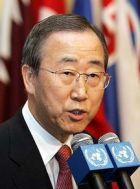UN chief to work closely with EU on Sudan, Somalia, Kosovo
Jan 24, 2007 (BRUSSELS) — U.N. Secretary-General Ban Ki-moon, on his first overseas trip since taking office, said Wednesday he aims to work closely with the 27-nation European Union to resolve the conflict in Darfur and other African crises as well as fighting climate change.

“I hope that my visit … will contribute to our further stronger partnership between EU and the United Nations,” Ban said. “We are experiencing a lot of regional conflicts and poverty issues, and violation of human rights, we need to cooperate fully toward mutual prosperity.”
Solana said the two discussed a wide range of issues, including the future status of Kosovo, the Middle East and Africa, as well as terrorism and human rights.
The two refused to go into detail on their discussions.
Ban was making his first visit to EU headquarters and was to meet European Commission President Jose Manuel Barroso later. He was also to pay a short visit to European Parliament President Hans-Gert Poettering and NATO Secretary General Jaap de Hoop Scheffer on the first leg of a seven-day trip to Europe and Africa.
EU officials said Ban would attend the weekly meeting of the EU’s executive commission to go over major issues like Sudan, Somalia, Congo and the future status of Kosovo.
They were also to discuss climate change and the EU’s recently stepped-up strategy to cut down carbon emissions.
EU foreign ministers on Monday urged Sudan’s president, Omar al-Bashir, to allow the deployment of a U.N. peacekeeping force in support of the 7,000-member African Union force that has failed to stop cease-fire violations in the country’s western Darfur region. Bashir has so far refused to allow in a U.N. force.
Ban is expected to push the issue with Bashir at an African Union summit in Ethiopia next week along with EU Development Commissioner Louis Michel.
Lawmakers at the European Parliament have called on the EU and the U.N. to put pressure on countries with closer ties to Sudan, like China and Russia, to sway Bashir to accept a larger peacekeeping force to try to end the conflict, which EU officials said has cost the lives of between 200,000 and 400,000 lives.
Ban met Tuesday with China’s U.N. ambassador to put pressure on Beijing to act.
China, which is one of Sudan’s biggest oil customers, has resisted U.N. attempts to force Khartoum to accept peacekeepers.
Ban has said he will make Africa and Darfur one of his top priorities during his tenure.
On Kosovo, Ban and Barroso were expected to discuss the EU’s possible role after the final status of the breakaway Serbian province is agreed to between Belgrade and Pristina.
Ban’s U.N. envoy, Martti Ahtisaari, is expected to present a plan on Kosovo to the ethnic Albanian and Serbian sides on Feb. 2, after which some further negotiations are planned.
However, British officials said Tuesday they did not expect a major re-negotiation of Ahtisaari’s proposal.
Ahtisaari plans to disclose recommendations on Kosovo’s future to Western governments and Russia on Friday.
After his visits to the EU and NATO, Ban is also to pay a visit to Belgium’s King Albert and Prime Minister Guy Verhofstadt before leaving for Paris, where he will attend a donors conference for Lebanon.
After Paris, Ban travels to Congo and Ethiopia before heading to the Netherlands to visit the U.N. war crimes tribunal.
(AP)
